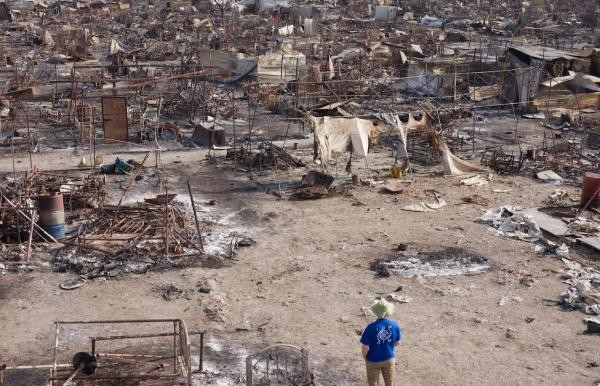An international research group says the attack on the United Nations base in Malakal last month was part of a organized effort by authorities in Upper Nile to push Shilluk people off the east bank of the White Nile river.
The attack which involved SPLA soldiers killed 40 people in the base and may have been planned in advance, according to the Geneva-based Small Arms Survey research group, which monitors armed violence in South Sudan and other countries.
“This attack was not an isolated event, but part of a concerted campaign by the Padang Dinka military and political elite of Upper Nile to push the Shilluk off the east bank of the White Nile, which is contested by both groups, and to cement control of an area that is to be called Eastern Nile state, in line with [President] Kiir’s decree [to create 28 states],” said the Small Arms Survey report, which is linked for download below.
The Padang Dinka are one of a few major ethnic groups in Upper Nile, the others being Shilluk, Nuer, and Maban.
The report describes how Kiir’s decree to create 28 states, which splits Upper Nile in three, has increased tensions between these various ethnic groups, particularly the Padang Dinka and the Shilluk.
Both of those groups claim areas on the east bank of the river including Upper Nile state capital Malakal which Kiir placed in the Padang Dinka-dominated Eastern Nile state. Shilluk people largely inhabit the proposed Western Nile state, while Nuer people are in the proposed Latjor state.
According to the Small Arms Survey, the appointed governor of the proposed Eastern Nile, Chol Thon, has further raised tensions by ordering Shilluk and Nuer people from the other states out of his administration.
Following the deadly attack on the UN base, Kiir has since tried to reverse or pause Chol’s purge of Shilluk and Nuer civil servants, saying the appointed governor’s move was “divisive.”
The report says Padang Dinka militia supported by the SPLA have used various other tactics to force Shilluk people from the river’s east side, including by blocking food aid deliveries, bombarding Shilluk villages with helicopters, and murdering and raping Shilluk civilians.
Attack on UN base likely planned
Regarding the attack itself, the Small Arms Survey says evidence indicates that the assault was planned in advance.
“Disturbances began on 16 February, when Padang Dinka militia fighters attempted to enter the PoC site with weapons, while Dinka IDPs began cutting the camp’s fences and evacuating their women and children,” Small Arms Survey reported.
The group further reported a weak response by the United Nations to stop the violence. As fighting as well as arson swept through the camp on the night of 17 February, UNMISS sent a single fire engine into the areas to put out some fires, but soon withdrew.
UNMISS then refused to open its gate to allow displaced people to escape the attack until the fleeing civilians forced their way out at around 10 am the next day.
“The SPLA and associated militias burnt down approximately 15,000 dwellings, looting Shilluk and Nuer areas. UNMISS discussed whether it should enter the PoC site on 17–18 February, but the UN peacekeeping forces expressed a reluctance to use deadly force, although UNMISS has a Chapter VII mandate that specifically allows the use of force to protect civilians,” the Small Arms Survey said.
“Finally, around 3 pm on 18 February, after the fighting had subsided, UNMISS peacekeepers entered the burning PoC site.”
The Small Arms Survey warned that violence against civilians including rape has continued around the UNMISS base in Malakal, and that both the ethnic-Shilluk Agwelek forces of Johnson Olony and the government forces including Padang Dinka are preparing for further clashes.
Photo: Aftermath of the attack on Malakal UN base (IOM)




